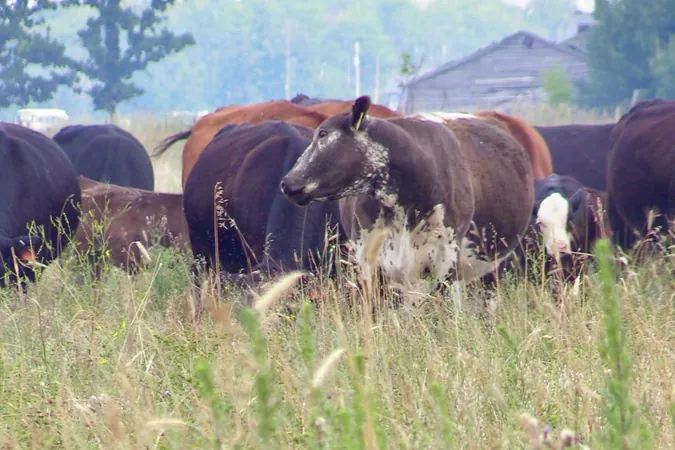
Mastering Animal Health: 8 Essential Tips for Farmers
2025-09-09
Author: Jacob
Take Control of Your Farm's Animal Health!
Striking a balance between animal health and farm profitability can be a daunting challenge for livestock farmers. However, adopting a proactive approach has proven to be one of the most effective strategies for minimizing veterinary costs.
"Implementing robust animal health protocols and early intervention practices not only enhances your livestock's well-being but also helps keep veterinary bills manageable," says Dr. Rob Swackhammer, a seasoned veterinarian from Upper Grand Veterinary Services.
Uncovering the Secrets to Healthier Livestock
As a livestock farmer, chances are you’ve encountered the frustration of dealing with sick animals. Swackhammer emphasizes the importance of creating systems that promote optimal nutrition, reduce handling stress, and minimize disease risks. Here are eight expert strategies to manage and prevent health issues on your farm.
1. Prioritize Nutrition
The foundation of good animal health starts with a balanced diet. Consulting with a nutritionist can help you design rations that meet your livestock's dietary needs and ultimately boost production.
2. Vaccination and Deworming Programs
Investing in regular vaccination and deworming routines is crucial. These programs not only protect your herd but also safeguard farm workers from zoonotic diseases. Collaborating with your veterinarian to develop a tailored vaccination plan is a smart move.
3. Optimize Handling Facilities
Effective animal handling is essential for facilitating treatment. Swackhammer notes that having the right equipment—like chutes or head gates—can significantly reduce stress for both animals and workers. Regular training with your handling systems can prepare everyone for emergencies.
4. Equip Your Veterinary Emergency Kit
Having a well-stocked first aid kit on hand can save lives during urgent situations. With guidance from your veterinarian, assemble essential supplies such as thermometers, syringes, and anti-inflammatory medications to tackle immediate concerns.
5. Build Skills and Confidence
Farmers who feel confident addressing animal health concerns are better equipped to take action. Engage in hands-on training opportunities and seek guidance from your veterinarian to improve your skills—beginning with basic tasks like administering injections.
6. Maintain Thorough Records
Accurate health records are vital for effective diagnosis and treatment. Document crucial information like vaccination schedules, treatment histories, and any health issues to facilitate discussions with your veterinarian.
7. Implement a Quarantine Procedure
Always quarantine new arrivals for two to four weeks. This practice minimizes the risk of introducing diseases to your existing herd and eases the new animal's adjustment.
8. Find a Mentor
Learning from experienced farmers can accelerate your understanding of animal health management. Having someone to turn to for advice before reaching out to a veterinarian can save you both time and money.
Embrace Proactive Health Management
Incorporating these proactive strategies can significantly boost the overall health of your livestock, enhance productivity, and support your farm’s profitability. "Every farm, regardless of size or experience level, has room for improvement in animal health management," stresses Swackhammer. Don't hesitate to reach out to your veterinarian to explore collaborative opportunities tailored to your specific needs.









 Brasil (PT)
Brasil (PT)
 Canada (EN)
Canada (EN)
 Chile (ES)
Chile (ES)
 Česko (CS)
Česko (CS)
 대한민국 (KO)
대한민국 (KO)
 España (ES)
España (ES)
 France (FR)
France (FR)
 Hong Kong (EN)
Hong Kong (EN)
 Italia (IT)
Italia (IT)
 日本 (JA)
日本 (JA)
 Magyarország (HU)
Magyarország (HU)
 Norge (NO)
Norge (NO)
 Polska (PL)
Polska (PL)
 Schweiz (DE)
Schweiz (DE)
 Singapore (EN)
Singapore (EN)
 Sverige (SV)
Sverige (SV)
 Suomi (FI)
Suomi (FI)
 Türkiye (TR)
Türkiye (TR)
 الإمارات العربية المتحدة (AR)
الإمارات العربية المتحدة (AR)